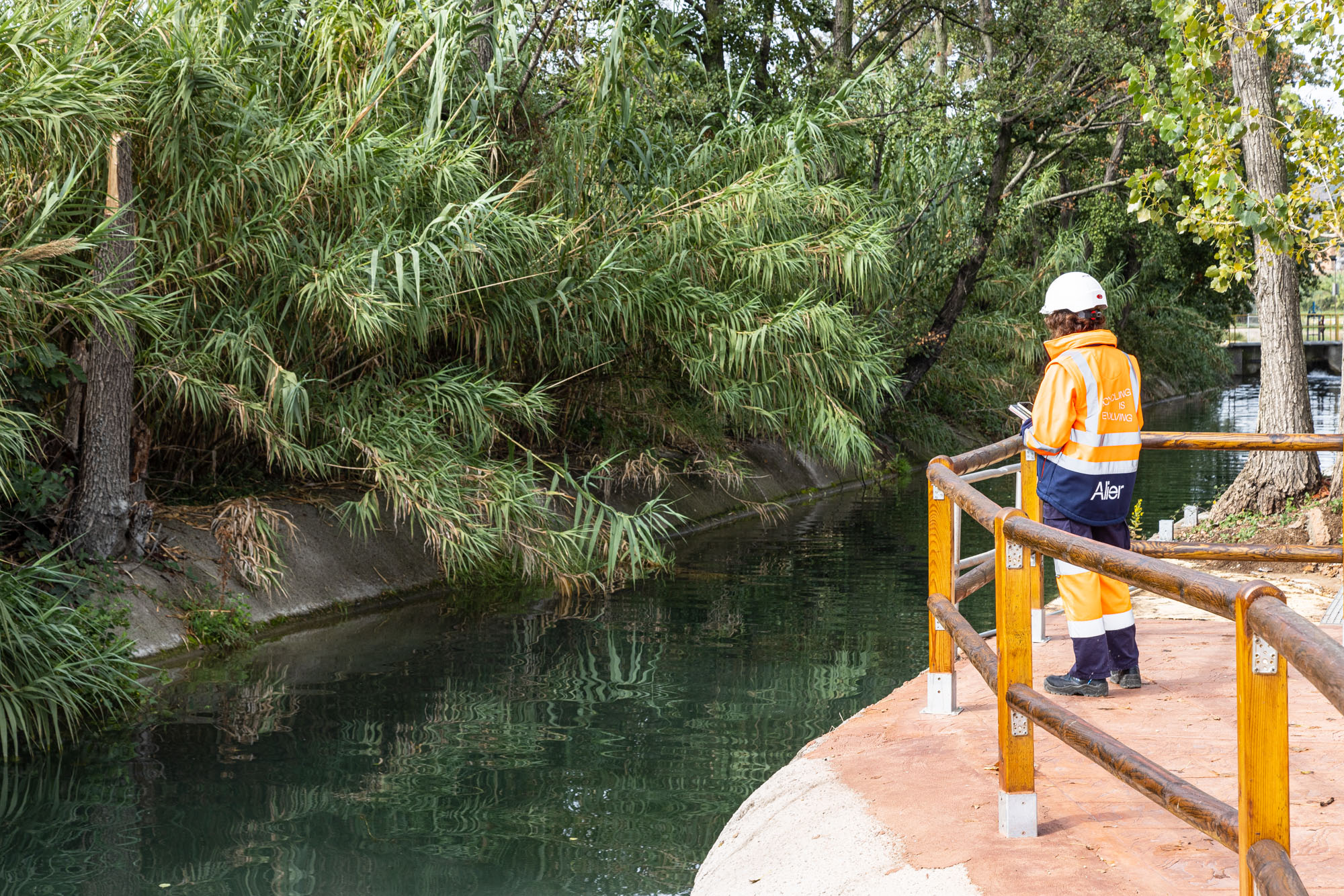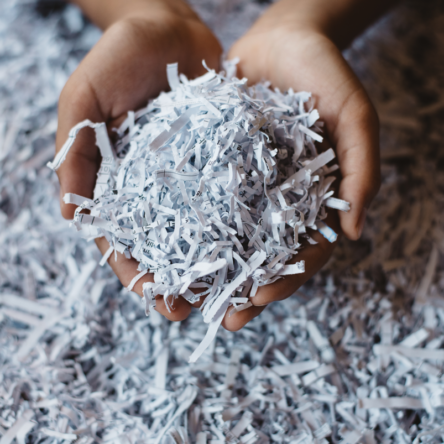
The Planet: A Matter for Everyone – How Does Alier act
Sustainability is a fundamental component at the core of our business strategy. And our commitment to the environment demonstrates it. Discover how we protect forests and accelerate the transition towards a circular economy with Isabel Vidal, responsible for Environment, Regulations, and Chain of Custody at Alier.
ISABEL, WHERE DO THE RAW MATERIALS USED IN ALIER COME FROM?
Alier manufactures 100% recycled paper from 100% recovered paper. We have certifications for FSC (Forest Stewardship Council) Chain of Custody, PEFC (Programme for Endorsement of Forest Certification Schemes), and we hold the FSC 100% certificate: FSC Recycled, where the product is made only from pre- or post-consumer recycled fiber with no content of virgin fiber. Additionally, we have the PEFC: 100% PEFC certified.
WHAT DOES BEING A MEMBER OF FSC MEAN FOR ALIER AND HOW DOES IT DEMONSTRATE ITS COMMITMENT TO SUSTAINABILITY AND SOCIAL RESPONSIBILITY?
The Forest Stewardship Council (FSC) is a global nonprofit organization dedicated to promoting responsible forest management worldwide for over 25 years. It created its respective forest certification system with the aim of combating illegal logging and abusive deforestation of large areas around the world. Currently, FSC® has more than 150 million hectares of certified forest, over 1600 authorized companies to promote products with the FSC label, and more than 55,000 certifications verifying sustainable sourcing.
We are members of the Forest Stewardship Council®, and we hold the FSC® Chain of Custody certification, with certificate number BMC-COC-006854. This certification allows recognition, on one hand, of products made from responsibly sourced wood, i.e., from certified forests, and, on the other hand, in our particular case, the content of recycled wood material or wood fiber in products, as it reduces pressure on forest logging.
As an FSC®-certified company, we practice economically viable, environmentally responsible, and socially beneficial management. This certification also demonstrates compliance with fundamental labor requirements (in accordance with FSC-STD-40-004 standard). That’s why Alier has developed a policy of employee welfare, committing to respect freedom of association, prohibiting forced labor, child labor, and discrimination in employment.
HOW DOES THIS FACT BENEFIT CUSTOMERS WHO CHOOSE ALIER’S 100% RECYCLED PAPER?
Having the FSC chain of custody certification means that each company through which FSC processed material passes until it reaches the final consumer complies with standards for controlling purchases, production, and sale of the final product, allowing the products to be identified as FSC 100% recycled certified. This way, our customers can associate the final product with a recovery process, and distinguish and choose it over others that do not have this certification. For our customers who are FSC certified, it is very important that we have this certification because for the product to be identified as FSC to the final consumer, it is necessary that all transformation stages through which it passes are certified companies, so that the chain of custody is not broken.
HOW DOES ALIER ACT IN ENVIRONMENTAL PROTECTION?
At ALIER, we prioritize quality, respect for the environment, and energy efficiency in carrying out our activities, committing ourselves to adopt a responsible attitude towards the natural environment, which is expected from all our staff and collaborating companies. We work to reduce environmental impact in all our operations, involving the entire value chain as much as possible. Alier is using recycled raw materials and making significant investments to reduce water consumption, recycle it, and improve the quality of wastewater. Regarding greenhouse gas emissions, aiming to disclose to all stakeholders the inventory of its GHG emissions corresponding to its facilities, we have calculated the carbon footprint for the years 2020 and 2021. This calculation has been carried out following the requirements of the UNE-EN-ISO 14064-1:2019 standard and obtaining the calculation seal from the Ministry for the Ecological Transition and the Demographic Challenge.
At ALIER, we are strongly committed to energy transition and have set a roadmap to achieve decarbonization. In mid-2024, the biomass plant is scheduled to start operating, generating all the thermal energy needed for ALIER’s paper manufacturing process, reducing direct CO2 emissions of scope 1 by approximately 97% compared to the present. Additionally, during 2025, we plan to finalize projects to increase the use of renewable energy by installing photovoltaic panels on roofs and agricultural land and implementing changes in production processes to make them more energy-efficient and less polluting, thereby reducing indirect CO2 emissions of scope 2 by approximately 30% compared to the present.
Furthermore, in addition to holding FSC/PEFC chain of custody certifications, ALIER has Quality certification based on ISO 9001:2015 standards. From Environmental and Energy Efficiency certifications based on ISO 14001:2015 and ISO 50001:2018 standards, we have obtained the calculation seal and DAP. It is noteworthy that in 2024, we achieved the gold medal awarded by the ECOVADIS certification, the global standard for business sustainability ratings. This result signifies that ALIER is among the top 5% of companies rated best in the management of sustainability policies, actions, and results in various aspects such as Environment, Ethics, Labor practices, Human Rights, and Sustainable Supply Chain.
Finally, after years of effort, we managed to become a B Corp. This certification is an indicator of our commitment to building a more inclusive and sustainable economy for all people and the planet. To obtain the certificate, it is legally required that decision-making takes into account workers, clients, suppliers, community, and the environment.
HOW DOES ALIER IMPLEMENT THE CONCEPT OF THE CIRCULAR ECONOMY IN ITS OPERATIONS?
ALIER implements the concept of circular economy in its operations through several key strategies:
Waste Valorization: ALIER transforms waste into valuable resources. Approximately 200,000 tons of urban selective collection waste are recycled each year, turning them into 100% recycled and recyclable products of higher added value. This includes paper for plasterboards, paper for bags and semi-extendable sacks, among other products.
Plastic Waste Valorization: ALIER has invested in a plant for plastic waste treatment to recover plastic and polyal (plastic and aluminum from brick packaging), difficult-to-treat materials that can be valorized.
Circular Fibers: ALIER provides circularity of textile fibers by manufacturing paper for bags from a mixture of textile waste and post-consumer beverage cartons, 100% recycled.
Construction Sack Recovery: ALIER contributes to the circularity by recovering construction sacks to drive the entire value chain and supports leading initiatives in Europe for this purpose.
Lastly, it’s crucial for society to commit to the circular economy and promote recycling, as well as choose sustainably produced products from companies committed to the 2030 Agenda and the Sustainable Development Goals (SDGs).




